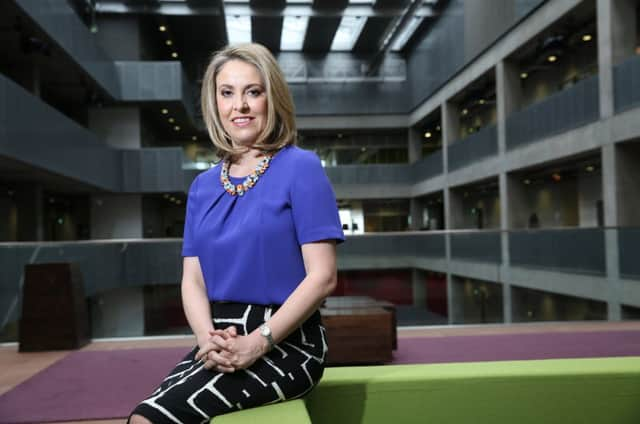Scotland '˜fairest in the UK' but still has £8k gender pay gap


The gap is the lowest for any part of the UK, but the figures have prompted a renewed call for more action to tackle the issue, particularly in senior roles.
The difference in average salary in managerial roles north of the Border is 21.5 per cent, analysis by the Chartered Management Institute (CMI) and online staffing resource XpertHR found.
Advertisement
Hide AdAdvertisement
Hide AdThey discovered that the average annual salary of a female manager stands at £28,622, but jumps to £36,457 for their male counterparts, a difference of £7,835. The figures include salary and bonuses, as well as perks such as a car allowance and commission.
Scotland beat every other UK region, including London and the south-east of England, and came in well below the UK-wide average pay gap of 26.8 per cent.
Last night, employability and training minister Jamie Hepburn said the Scottish Government was dedicated to closing the pay gap and was “working to ensure women are better-represented in senior and decision-making roles and taking action to challenge pregnancy and maternity discrimination.
“We are also investing in programmes to help women get back into work after a career break.”
Advertisement
Hide AdAdvertisement
Hide AdThe highest gap was found to be in the Midlands, at 29.7 per cent or £12,707, with inner London ranking fifth at £14,455 and the south-east tenth at £8,795.
The gender pay gap issue was thrust back into the national spotlight earlier this year after the BBC released the salaries of its top stars. The corporation’s Scotland editor Sarah Smith and presenter Kirsty Wark were among those to sign a letter demanding immediate action to tackle it.
The CMI and XpertHR said salary data was examined in the wake of UK government reporting regulations that came into effect in April, obliging firms with at least 250 employees to publicly disclose in the next year the size of their gender pay gap, but finding that less than 1 per cent have met their obligations. Just 77 out of 7,850 eligible employers had done so by 22 September.
The report also shows that women are twice as likely to fill junior management positions as men (at about two-thirds and a third respectively), while men are roughly three times more likely to occupy senior positions (at about 74 per cent and 26 per cent respectively).
Advertisement
Hide AdAdvertisement
Hide AdHowever, for women who do progress to more senior roles, the pay gap started to widen “considerably”, with men at director level earning an average of £175,673 and women £141,529.
CMI chief executive Ann Francke said: “Too many businesses are like ‘glass pyramids’ with women holding the majority of lower-paid junior roles and far fewer reaching the top.
“We now see those extra perks of senior management roles are creating a gender pay gap wider than previously understood. The picture is worst at the top, with male CEOs cashing in bonuses six times larger than female counterparts.”
The average bonus for a male chief executive came in at £89,230 compared with £14,945 for a woman. The analysis also suggested that while salary and bonuses are picking up for both men and women, the benefits were going disproportionately to men. Male directors picked up a 5.8 per cent increase in pay and bonuses, against 3.7 per cent for their female equivalents.
Advertisement
Hide AdAdvertisement
Hide AdMs Francke added: “Our data shows we need the government’s gender pay gap reporting regulations more than ever before. Time for more companies to step up and put plans in place to fix this issue. It’s essential if UK companies are to survive and thrive in the post-Brexit world.”
XpertHR content director Mark Crail said: “Some people have tried to explain the gender pay gap away as being the result of different working hours or individual career choices. But when the analysis is based on the pay of more than 100,000 individuals in well over 400 organisations, it is clear that the pay gap is a very real fact of life for UK managers.”
The CMI and XpertHR also said companies face increasing pressure to follow the new regulations in disclosing gender pay, but also to publish an action plan detailing the practical steps they are proposing to close the gap.
They cited research published last year by management consultants McKinsey, discovering that achieving parity would add up to £150 billion a year to the UK economy by 2025, although 1.5 million of the 1.9 million new managers needed by 2024 would need to be women to achieve balance.
Advertisement
Hide AdAdvertisement
Hide AdThe CMI also said previous research found that four out of five managers had witnessed some form of gender discrimination in the workplace.
But there was evidence of the financial benefits of gender diversity from a separate report out today by energy giant SSE, which said it was the first FTSE 100 company to publish its gender pay gap.
The Perth-based firm, which has more than 20,000 staff, said it has calculated the financial value generated via its investment in inclusion and diversity initiatives between 2014 and 2017. For every £1 invested by SSE, there was a £4.52 return for gender diversity initiatives undertaken over the three-year period, and it sees the potential to increase this to £15.